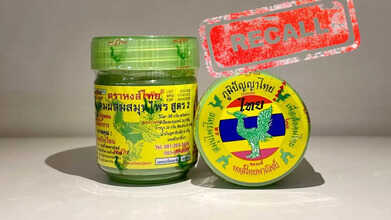- Health Conditions A-Z
- Health & Wellness
- Nutrition
- Fitness
- Health News
- Ayurveda
- Videos
- Medicine A-Z
- Parenting
Hong Thai Herb Inhaler Recalled: Thai FDA Flags Popular Brand Over Contamination — All You Need To Know

Credits: Canva
Hong Thai Herb Inhaler Recalled: Sold at airport kiosks, roadside stalls, and trending online, Thailand’s go-to herbal inhaler, a popular everyday pick-me-up product has been pulled from the market after tests revealed unsafe microbial levels in certain batches. The recall follows a warning from Thailand’s Food and Drug Administration (FDA), which announced on Tuesday, October 28, that one batch of the product failed to meet microbial safety standards.
According to a three-page advisory, Batch ‘000332’ of the “Herbal Inhaler Formula 2” did not pass contamination checks. Thai Herbal Hong Thai Ltd., the company behind the inhaler, has recalled Lot 000332, about 200,000 units, after the FDA’s findings, as per The Independent.
Hong Thai Herb Inhaler Recalled
Thai Herbal Hong Thai, the maker of Hong Thai Herbal Inhaler Formula 2, has officially recalled Lot 000332 after Thailand’s FDA found microbial contamination that exceeded acceptable safety levels during routine testing. The affected batch includes 200,000 units.
Founder Mr. Teerapong Rabueathum explained that the contamination was limited to Lot 000332, which was produced on December 9, 2024, and set to expire on December 8, 2027. He clarified that all other batches remain safe for use and that reports of a full production or sales suspension were incorrect. The FDA notice, he said, only applies to the contaminated lot.
The company stated that microorganisms were found beyond the standard limits, though the FDA has yet to identify the bacterial strain or explain its specific health risks. Mr. Teerapong added that the company plans to meet with the FDA to review the test results and clarify technical details.
He mentioned that their in-house tests before the product’s registration had shown no issues. Hong Thai has begun recalling the affected batch from retailers, though only part of the stock could be retrieved since it was produced earlier.
What Is Hong Thai?
Known locally as yadom, these herbal inhalers are a staple across Thailand and other parts of Southeast Asia. They are small, portable tubes filled with essential oils, menthol, camphor, and eucalyptus, often used to relieve nasal congestion, dizziness, or motion sickness. Over time, these inhalers have become household essentials and tourist favourites.
Their popularity grew even further after global celebrities such as BLACKPINK’s Lisa, Hollywood actor Chris Hemsworth, and British rapper Central Cee were seen using them, helping the product gain traction among international audiences.
What To Do With Your Recalled Hong Thai?
Customers who have inhalers from the affected batch can return them to Hong Thai Panich, 434 Phutthamonthon Sai 2 Road, Bang Phai, Bang Khae, Bangkok 10160. Refunds can also be requested by contacting 02-803-1549, 081-252-3406, 092-740-5500, or 092-740-7700.
The company has said it has now upgraded its manufacturing process, adding new quality checks and ultraviolet (UV) sterilisation at multiple stages of production to ensure future batches meet safety and hygiene standards. “We sincerely apologise to our partners for the inconvenience and to our valued customers for any concern caused,” the company said in a statement. “We remain committed to maintaining your trust and thank you for your continued support.”
Children Getting Fewer Vaccine May Be A 'Better Thing', Says RFK Jr, As US Struggles With Rise In Flu Activity

Credits: Wikimedia Commons
"May be it is a better thing that fewer children are receiving the flu vaccine," said Robert F Kennedy Jr, the Health and Human Services Secretary of the United States as the country fights with a surge in flu cases. RFK Jr said this in a response to a CBS News journalists' concern over rising flu cases and the drop in the number of flu vaccines.
This week, the Centers for Disease Control and Prevention (CDC) announced vaccines to fight respiratory syncytial virus or RSV, meningococcal disease, flu, and COVID are the only recommended jabs for children at high risk of serious illness or must be administered after being consulted with doctors and parents. This is part of the CDC and Trump administration's effort to scale back the childhood vaccine scheme.
In an interview with the CBS News, RFK Jr. said, "We are not taking vaccines away from anybody. If you want to get the vaccine, you can get it. It is going to be fully covered by insurance, just like it was before." However, now, there is an added step. Vaccines that were compulsory before now requires a consultation with the physician first. "You have to, yeah, you need to do shared decision making with your physician, which is how it ought to be," he said.
Fewer Flu Vaccine Could Be A Better Thing: TFK Jr, Is There Evidence?
The CBS News reporter asked if there is any evidence that fewer kids getting the vaccine is actually a "better thing" The reporter also pointed out that many kids died of flu last year and that no evidence shows that the kids who died were vaccinated. In fact, a roughly 90% of kids who died from the flu in 2024 were not vaccinated, showed the CDC data.
To this, Kennedy quoted a Cochrane Collaboration study. It is a UK-based health care research nonprofit, which he called, "one of the ultimate arbiters of vaccine safety and clinical data". As per him, the study is an extensive meta review of the flu vaccine. Kennedy said that the study found "there is no evidence that the flu vaccine prevents serious disease or that it prevents hospitalizations or death in children.
However, the medical community does not respect this. In fact, the CDC itself has cited from various studies, including a 2020 and 2017 study from Pediatrics journal, and a 2022 and 2014 study from the journal of Clinical Infectious Diseases, which is an official publication of Infectious Diseases Society of America, and found that vaccines in fact prevented severe and life-threatening complications in children from the flu.
The CDC notes: "ACIP recommends any licensed, age-appropriate flu vaccine for children without preference for any one flu vaccine over another. In several studies, flu vaccine effectiveness was higher among children who received two doses of flu vaccine the first season that they were vaccinated (as recommended) compared to "partially vaccinated" children who only received a single dose of flu vaccine."
However, Kennedy is fixed at his opinion that "here is no scientific evidence that the flu vaccine prevents serious illness, hospitalizations, or death in children."
Becky Quick Speaks About Her Daughter’s Genetic Disorder —What The Diagnosis Is About

Credits: AP
Becky Quick recently spoke about her 9-year-old daughter Kaylie’s private struggle with a rare genetic disorder. In an interview with People, published Thursday, January 8, the 53-year-old co-anchor of CNBC’s Squawk Box revealed that Kaylie has SYNGAP1. According to the Child Neurology Foundation, SYNGAP1 is a genetic condition that can cause seizures and developmental challenges. Quick recalled that she first noticed something was off “probably around 8 months,” when Kaylie wasn’t reaching her developmental milestones.
“Sometimes her eyes would cross. You just know as a mom that something isn’t right,” Quick told People, adding that after observing her daughter and reviewing developmental studies, it became clear that Kaylie wasn’t meeting expected benchmarks. “We immediately began working with therapists. They supported Kaylie in rolling over, achieving fluid movements, eventually walking, and so many other skills. But we also noticed additional concerns developing.”
Becky Quick Daughter Battles SYNGAP1
For nearly a decade, Quick has kept her daughter Kaylie’s SYNGAP1 diagnosis private. The condition, as defined by the Children’s Hospital of Philadelphia, is a rare genetic disorder that can lead to a variety of neurodevelopmental challenges. It currently has no cure and often requires round-the-clock care.
The journalist took Kaylie to her pediatrician, who recommended a study with a developmental specialist. The results confirmed Quick’s fears: her daughter was not reaching key milestones.
“We started working with therapists immediately,” Quick said. “[They] helped Kaylie develop rolling, fluid movement, eventually walking, and many other skills. But we also observed additional issues.”
A neurologist then performed an EEG study, which revealed that Kaylie was experiencing subclinical seizures — subtle seizures that aren’t visibly noticeable. A subsequent genetic test confirmed that Kaylie had SYNGAP1.
What Is SYNGAP1?
SYNGAP1 (SRD) refers both to a gene and the rare neurological disorder it causes. The condition is marked by intellectual disability, epilepsy, and autism spectrum traits, arising from a mutation that reduces the SynGAP protein, which is essential for proper synaptic function in the brain, according to MedlinePlus. Without adequate SYNGAP1 protein, synapses become overly excitable, impairing communication between neurons and leading to the neurological difficulties observed in SYNGAP1 patients, as per National Institute of Health.
Becky Quick Daughter: What Are The Symptoms Of SRD?
SYNGAP1 is considered a spectrum disorder, meaning patients experience symptoms differently and with varying severity. The exact factors influencing symptom expression or intensity remain unclear. The most commonly observed signs include, as per NIH:
- Intellectual Disability (mild to severe)
- Hypotonia (low muscle tone)
- Global Developmental Delay
- Epilepsy (including subtle eyelid flutters, brief jerks, staring spells, and drop seizures)
- Sensory Processing Disorder
- Delays in Gross and Fine Motor Skills
- Dyspraxia (coordination difficulties)
- Speech Delay/Apraxia (mild to severe)
- Autism Spectrum Disorder
- Sleep and Behavior Disorders
- Visual Abnormalities
- Not every patient will exhibit all of these symptoms.
Becky Quick Daughter: What Causes SRD?
SYNGAP1-related disorders arise from a variant on the SYNGAP1 gene (6p.21.32). Each human cell contains 23 pairs of chromosomes, totaling 46, with thousands of genes on each chromosome. Most genes come in pairs, one inherited from each parent, and their primary role is to produce proteins that regulate tissues and organs.
When a gene experiences a variant, sometimes called a mutation or alteration — it can stop functioning properly. Variants occur naturally, similar to a typo when DNA is copied from cell to cell, or they may result from environmental factors.
A de novo variant is a genetic change that appears for the first time in a family, occurring early in reproductive development. Most SYNGAP1 patients carry de novo variants. For families with a genetic report, understanding the variant can help clarify the diagnosis and guide next steps.
India’s Antacid Habit Is Putting Hearts, Kidneys, Guts, and Bones at Risk

Credits: iStock
Indians are popping antacids like candies, and they are putting their hearts, kidneys and gut health at risk. Doctors from time and again have cautioned patients to not take such pills without prescriptions.
Antacids are prescribed proton pump inhibitors or PPIs, used commonly to reduce the amount of acid in the stomach and helps to treat and prevent various acid related conditions. However, in India, acidity is not treat as a symptom, but a lifestyle condition, which has made these pills so common. These over the counter access also created medical complacency, this means the availability has blurred the line between short term relief and long term therapy.
How does antacid impact your kidney health?
Repeated use is increasingly associated with acute interstitial nephritis and chronic kidney disease. What makes this dangerous is that kidney damage often develops silently, discovered only when kidney function has already deteriorated significantly.
How does antacid impact your gut health?
It also impact the gut microbiome, and causes chronic digestive problems. Stomach acid regulates gut bacteria. Suppressing it allows harmful bacteria to flourish, leading to bloating, infections, diarrhea, and conditions like small intestinal bacterial overgrowth (SIBO).
How does antacid impact your bone health?
Furthermore, regular usage of antacids could make your bones weak too. As per a 2023 study published in the journal BioMed Research International, pantoprazole cause bone loss, which could be prevented by adding octreotide.
The study analyzed the serum levels of calcium, phosphorus, and ALP before starting the treatment, and at the end of 12 weeks of treatment on pantoprazole, significant decline in calcium levels were noticed, as compared with other groups. The study also found that octreotide significantly prevented the effect of pantoprazole on the serum levels of calcium and ALP.
The study also found that pantoprazole decreased femoral bone density and femoral BMAD. Besides this, another decrease was found in the femoral bone weight and volume as well as the trabecular volume.
How does antacid impact your heart health?
Frequent heartburn is also a symptom of gastroesophageal reflux disease or GERD. This is a condition in which the valve between the stomach and the lower esophagus malfunctions and allows stomach acid to bubble up into the esophagus. This is often treated with antacid, which may mask the real problem.
Over time, untreated GERD can injure the lining of the esophagus and increase the risk of serious complications, including Barrett’s esophagus, a condition that can raise cancer risk. Also, symptoms often blamed on heartburn, such as chest pain or burning, can sometimes signal a heart attack. That’s why experts stress getting a proper medical evaluation before self-treating with antacids.
The safer alternatives are:
Famotidine (Pepcid, Calmicid, Fluxid, Mylanta AR) is a potent H2 blocker used to manage acidity and heartburn. Studies show that famotidine is not thought to raise the risk of osteoporosis.
Other options: Ranitidine (Zantac - where available, as it was withdrawn in some markets due to safety concerns) and Nizatidine are other H2 blockers.
Note: Health & Me do not encourage discontinuance of any prescribed medicine by a doctor. Before making any change in your medicine schedule, please speak to your doctor/GP.
© 2024 Bennett, Coleman & Company Limited

